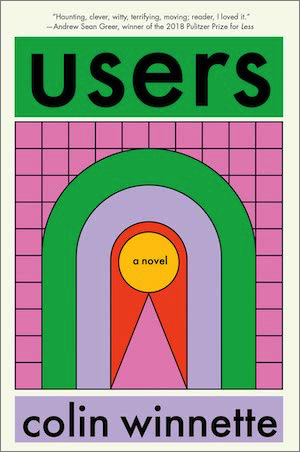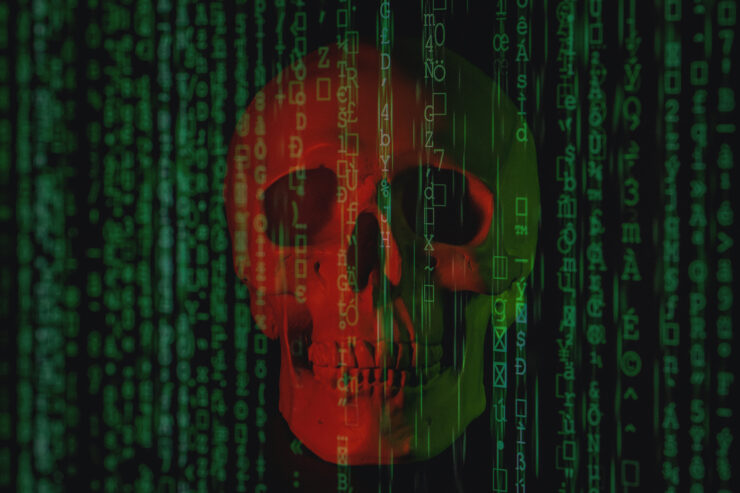Silicon Valley dreams of itself as the realm of the future, a fifty-mile cradle between San Jose and San Francisco where the impossible is born. It’s here, after all, that so many of the gadgets and doo-hickeys foretold by Isaac Asimov and his ilk actually come to be. Unsurprising, then, that the genre of choice for recent fiction about tech companies has been sci-fi. The past half a decade alone has seen dozens of such novels, from the contemplative (Jennifer Egan’s The Candy House) to the satirical (Josh Riedel’s Please Report Your Bug Here; Dave Eggers’s The Every) to the bluntly dystopian (Rob Hart’s The Warehouse).
A new cluster of novels about big tech, though, have added to the subject’s standard fare of science fiction a helping of its nastier cousin, horror.
Colin Winnette’s Users, Daniel Hornsby’s Sucker, and Sarah Rose Etter’s Ripe find horror useful for its abiding interest in the vulnerability of the human body, that stubborn thing that no cloud-based consciousness engine can (yet) do away with entirely. In other words, the cybergothic provides a ready template for thinking through the physical toll of the virtual worlds that are rapidly swallowing contemporary life. From ghosts to vampires to sentient black holes, the monsters of this triptych are only slight exaggerations of our increasingly dissociated existences, asking what will happen to the husks we leave behind in meatspace.
[Note: Spoilers for Ripe, Users, and Suckers lie beneath.]
Users by Colin Winnette

Users follows Miles, an amoral employee of an immoral company that designs exceedingly immersive virtual realities. In terms of technical sophistication, these in-brain experiences are several ticks to the right of what’s currently possible in 2023 (think Oculus plus mind- and memory-reading capabilities). The company’s profit motive, though, is thoroughly of our own era: users’ highly personal digital reveries conveniently provide the corporation with an endless wellspring of the most intimate consumer data imaginable—“unchecked want. Pure desire.”
Miles’s career, and the novel’s plot, take off when he invents The Ghost Lover, a highly popular virtual scenario in which the user is gently haunted by the spirit of an old flame. The game seamlessly marries Gothic creature with science fictional technology, “merging elements of real life with the impossible logic of the subconscious[,] … the extra-rational.” It is there, after all, in the locked basement of the unconscious, that horror thrives—and Ghost Lover asks whether we really ought to use science to open the door to that particular cellar. “If Miles had learned anything from working at a virtual reality company that invited users to build customized experiences out of the content of their dreams,” an early passage explains with unmissable foreboding, “it was that we all kept horrible parts of ourselves alive in the dark.” It’s a Gothic prophecy that Miles himself eventually fulfills when he unwittingly conjures an incestuous VR fantasy late in the novel.
Souls without flesh, ghosts are the original avatars, emblems of the Cartesian split that allows our minds to ditch our skin-bags and spend time “in” an internet shopping mall or the pixelated elsewhere of a Netflix show. Fittingly, disembodiment is built into the very architecture of The Ghost Lover: in order to play, the user lies down in a pod-like device called The Egg, which completely encases the player, hijacks their vision, and “move[s] and monitor[s] [their] body for them, allowing the user to fully engage with the potential of the company’s platform while remaining in an isolated, reclined, and passive state.”
The Egg’s emphasis on physical insulation—only a slight exaggeration of VR pod designs that already exist today—epitomizes the ways that entertainment technology severs us not just from our own bodies, but from those around us. Miles’s fate eventually takes this to its logical extreme, the novel’s conclusion trapping him indefinitely in the Egg and its imagined worlds. But sci-fi again proves a natural bedfellow to horror: the ghost as supernatural archetype also speaks to the online age because it is a figure of profound loneliness. From Beloved to Patrick Swayze’s Sam, the sad specter offers the living an impossible fantasy of communion with someone who is gone.
Miles’s ghost game is explicitly born of just such a wish fulfillment. As the novel progresses, he becomes increasingly estranged from his borderline sociopathic older daughter and cold wife. (The latter eventually brings their marital detente to a crisis by moving into their family’s basement with the architect who has been slowly remodeling their home into a disorienting, Udolpho-ish castle. Yowch.) A few months after his father dies—a loss that completes his isolation—Miles spends a rare weekend at home without his partner and kids. Soon, he begins to hear mysterious thumps in his bedroom walls at night, sounds that seem “supernatural, like something from beyond was trying to use the walls to communicate with him.” It isn’t long before Miles has dreamed up The Ghost Lover, a game for people who would rather be haunted than confront the reality of their solitude. The result is “a curiously infinite navel,” a self-generated and self-perpetuating fantasy of being wanted. An eternal scroll, in other words, for the extremely online.
Ripe by Sarah Rose Etter

Dissociation is also the emotional status quo of the tech world depicted in Ripe. Cassie, an employee of a Bay Area startup specializing in the innately sinister field of persuasive technology, has been followed since birth by a small black hole. This cosmic familiar is the definition of horror, concentrating all of the universe’s most ominous possibilities in one place: “danger, nothingness, mystery, evil, other dimensions, the unknown, the mystical void, death, the end of the world as we know it.” Yet within the novel, the hole functions less as a physical threat to Cassie than as an emblem of her depression. The Cassandra to her Cassandra, the hole grows and shrinks in proportion to her loneliness, singing her name with “the siren song of the void.” Like Winnette, Etter is more interested in the melancholic registers of the supernatural than in its abject terrors. (The two moods do sometimes converge, however, as in the string of gory suicides that Cassie witnesses in San Francisco and its surrounds, one-man protests of the region’s unlivable economic and spiritual conditions.)
Cassie increasingly outsources her feelings to her deep-space mood ring because she finds Silicon Valley so very inhospitable to them. “To survive here, I have split myself in two: my true self and my false self,” she notes. The reasons for Cassie’s alienation from the local culture are manifold: the workaholic koolaid that she must guzzle in order to pay her astronomical rent; tech conglomerates’ boasts of bettering the world while they in fact do little more than to turn user data into ad revenue; the screen addiction that gobbles up what little leisure time might have been spent on social connection, commuters’ “faces melting into their phones.”
In response to these and other miseries, Cassie’s chosen survival mechanism is the waking blackout, an elective numbness both to her immediate surroundings and to her body. During work meetings that toggle between mundanity and corporate malfeasance, Cassie keeps sane by mentally teleporting to far-off scenes: “a mountaintop, nimbus clouds, volcanoes erupting, galaxies colliding and combining.” Even the eminently physical experiences of sex and pregnancy succeed only in further separating Cassie’s mind from her body. When a pregnancy test comes back positive, “I expect something volent to happen inside of me …. No feeling comes. I want to cry or throw up, but neither happens.” It comes as little surprise, then, when the novel ends with a portrait of radical and voluntary disembodiment. Swallowed by a void, Cassie—like Miles, in the final pages of Users—abdicates from her flesh in an act that suggests both obliteration and her only chance at freedom.
Sucker by Daniel Hornsby

Sucker also considers the physical abjection wrought by big tech, but carries out its critique by zooming in on the body rather than disappearing it. This is a story, according to narrator Chuck Grossheart, “soggy with blood (not to mention the other human juices: vomit, liquefied organs, incidental semen, some of those symbolic medieval humors, nervous sweat, and piss…).” Though the gore doesn’t rev up until its final chapters, Sucker’s recurring metaphors are the stuff of Giallo—not just blood, but also the heart (see: our anti-hero’s surname), and cancer cells. In Hornsby’s crosshairs are not just the real-life, secret body count behind so many of Silicon Valley’s luxury inventions (one thinks, for instance, of the injuries suffered by Congolese people who mine the cobalt needed for smartphone manufacture), but also the technorati’s obsession with using “‘technology [to] unlock … the full potential of their [own] bodies and minds,’” as the novel’s villainous entrepreneur brags. It’s a line that could have been uttered without irony by any number of the techies swept up in the current longevity craze.
Grossheart is the listless heir to an ill-gotten family fortune, dark money that gets him a job at an even darker institution: a Theranos doppelganger that aims to rapidly test and treat diseases with nanobots in the bloodstream. The eventual revelation that the outfit is being run by vampires—a self-anointed plutocracy that plans to “help” less brilliant humans by controlling their minds via nanobot—is not meant to surprise the reader. (If the novel’s title and cover art weren’t giveaways enough, there are plenty of other nods along the way to this lightly fictionalized tech elite’s literal and figurative bloodsucking, from bats that double as surveillance drones to technobabble investor pitches that glamour the listener.) Instead, the book’s dramatic tension comes from the main character’s willing obliviousness to the nosferatus in his midst, even as he falls more deeply into their clutches and unwittingly advances their plans.
Of course, the vampire is by no means new metaphorical ground for critiques of corporate America’s greed, or even that of Silicon Valley specifically. The bloody deeds of Peter Thiel (rumored), Elizabeth Holmes (confirmed), and the like are too creepy not to have already invited the analogy many times over in journalism and fiction alike. But Hornsby is unusually committed to the bit. In his simultaneously paranoid and plausible vision (The Crying of Lot 49 is a frequent touchstone), the conspiracy of wealth that rules the Bay Area sucks dry everything and everyone, from the underclasses of the poor and sick who desperately agree to participate in illegal lab testing, to the local arts scene (which, in a poisonous irony, must rely on tech funding to survive in a region that tech has made prohibitively expensive for artists).
Taken together, this trio of novels suggests that the physical and social dissociation increasingly baked into our technology makes for an ideal breeding-ground for moral indifference. Sucker, Users, and Ripe bring us tech worker protagonists who become responsible for monstrosity so gradually that they’re barely aware it’s happening. Hornsby, Etter, and Winnette differ chiefly in their degrees of optimism that the foot soldiers of big tech can—or even want to—disentangle themselves from such amorphous complicity: as Grossheart declares with disquieting pride in Sucker’s final line, “My chest was hollow. I had no heart. I didn’t need it.”
Chelsea Davis is a writer from San Francisco. Her essays on film and literature have appeared in the Los Angeles Review of Books, Literary Hub, the Public Domain Review, and Electric Literature, among other publications. More of her writing is available on her website, https://chelseamdavis.net, and you can find her on Twitter @Unrealcitoyenne.










